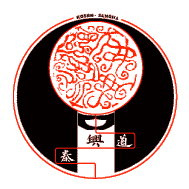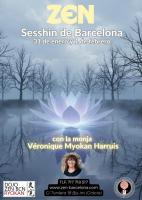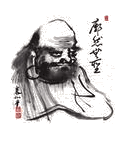Question
Answer from Master Kosen
is the kusen he gave :
In "Bussho, the nature of buddha", a chapter of Master Dogen's
Shobogenzo, you can find the following mondo, which deals with a very
important issue, and in my opinion represents the essentials of what Zen
is. It is the famous koan, the most famous historical Zen koan:
A monk asked Master Josshu: "Does the dog have the nature of the
buddha?"
In Chinese: "Mu."
Josshu answered: "No."
In Chinese: "Mu."
The dog died a long time ago, but Master Josshu's answer lasts.
Fortunately, this story was written in Chinese. Had the answer been just
"No", it wouldn't have become famous. But mu, in Chinese, and specially
this "Mu" pronounced by Josshu, has a much deeper meaning than "no" -
even if at the same time it also means "no". "No" is one of the first
words that parents teach their children and that children learn how to
pronounce. It's a word you cannot understand when you are a baby.
"Non! Don't touch that!
"Why?
"Do you love me?
"No. Mu."
Our life, our body, our existence is full of these contradictions. They
have not been made up by the masters to enjoy themselves playing with
words. These contradictions are called doors. And the locks of these
doors, to continue with the same image, are usually called koans. Koans
have been used by all the masters, not only in Zen rinzai. Koans are
formed by our own limitations, it is not the masters who have invented
them, but human beings. Each human being has locked himself up inside
imaginary spaces of consciousness that he cannot leave but by
passing the threshold. If you stay where you are, if you have a high
opinion about yourself, you will never be able to get out of your space.
Master Munmon, or Unmon, or Unmen (depending on the pronunciation) says,
regarding this koan by Josshu: "If you intend to practise Zen, it is
imperative for you to cross the barriers of your own limitations. If you
want to realise something, it is fundamental for you to cut off the root
of your own spirit. If you do not succeed to cut off this root, you will
remain as a ghost." What is this famous barrier, this threshold we must
pass? It is only to understand the deep meaning of this "mu". "In fact,
he says, it's the barrier of faith". It is called the door-less barrier
of the zen tradition. If you cross it, you will be able to talk
directly, intimately with Josshu, and you will be able to walk hand in
hand with the ancestors and with the masters."
In the rinzai tradition, when you do a sesshin like now, you enter the
master's room and he gives you a koan. He says: "What's mu?" You go
back to the dojo, you sit down in zazen, and you have to concentrate on:
"What's mu?" It is not about the koan that the soto line does not agree
with the rinzai line. The soto line masters have all also used and
studied the koans. It's about the method, about the systematization of
the method of koan. This method tends to drive the guys completely mad.
If you are asked what mu is, and you don't know, what
does that make you think of? You could be asked: "What's gloup?" Then,
if you think about it long enough, you will perhaps create an
enormous tension within themselves, they will come to a particular
state, similar to that caused by hallucinogenic drugs, mixed with some
amphetamine. They feel a certain sensation, then they say: "This, this
must be mu!" What I'm saying is obviously parodical. One can also
criticize certain defects of the soto line. The truth is that there is
no difference. There are good masters and bad masters. It is not being
Japanese and having a violet kolomo what makes them good. In order to
notice the difference, in order not to let yourself be abused by
appearances, in order not to doubt about the good and not to follow the
bad, you must understand this koan: "mu".
This is Dogen's comment about this mondo: "One first thing to clarify is
the meaning, the consequences of this question. If even a dog has the
nature of buddha, then any living being has truly this nature."
Then, the question that comes to your mind is always this same stupid
question: why practice? What's different about the people who practice?
Until when will we need to carry on practicing, training ourselves,
putting ourselves into question? After many years, after satori, after
shiho, will we still need, as if we were beginners, to carry on
training, abandoning ourselves, regretting our stupidity, our human
weakness, aspiring to freedom and to the perfection of the nature of the
buddha?
Hypocritically, this monk asked - perhaps comparing himself to a dog -
whether even the dog, who enjoys smelling slops, has the nature of
buddha. Josshu answered what you already know. I think he was angry,
this monk made him angry. He answered: "No!" to upset him, to make him
return to himself. Because we know very well that the dog does have
the nature of buddha.
We could ask ourselves : "Am I the same person in ordinary life and during a
sesshin? What is the difference between a friend and a disciple? Can one
become a true monk whilst living a family life?" All these questions can
be answered "Mu!", and they can be also answered "U!" U is the opposite
of mu, it means: "it exists", it means "yes". Mu means: "it doesn't
exist", "no". What we are interested in is knowing if the dog - or the
cow - has the nature of buddha. Can the common man become of a great
dimension?
Keep the back of your neck straight when you practice zazen,
specially those who work on the computer. A good posture is very
important. One must strengthen the back of the neck. It is hard to keep
the balance. Whatever work we do, it pollutes us. For example, if you
pick potatoes, your kindneys hurt; if you make concrete or lay bricks,
your back hurts; computers makes your eyes hurt; prostitution makes your
ass hurt. Work pollutes. That's good, as there isn't enough for
everyone. There is no work anymore. Finally, one must look at the future
in a realistic and positive way. There is no oil anymore: good luck! We
will stop draining the soil and polluting the atmosphere. Only zazen
unpollutes. Working reasonably is not bad. One must do a little bit of
work or different types of work - four hours of intellectual work,
three hours of physical work. Long life to part-time work! We are reaching the
ideal society, we are reaching the timse where mankind could learn how to
live. All the old values have lost their meaning, the world is becoming
mad. After that, it will find a stability. The best life stability is
what is called "gyoji" in Zen, that is, a balance. Master Sivananda, who
was Master Deshimaru's friend, used to recite this song, or poem:
"Eat a little,
sleep a little,
work a little,
exercise a little,
etc."
that is, find the balance, a way that does not pollute, have the
opportunity to change: not always sitting, not always standing, not
always lying. Precisely, "zazen", Master Dogen says, "is neither sitting
nor standing nor lying." It's neither working nor resting, neither
thinking nor not thinking, neither loving nor not loving.
What must we do to pass the door, to understand what's obvious?
There are some people who do not want to understand, because they are
attached to their personality. They think their personality is very
important. Of course, personality can be very important as a means, but
not as a purpose in itself (it's like money: money is very important as
a means, it can be used to useful purposes). You can respect yourself
and at the same time not give importance to your own opinion. As long as
you don't let go of your opinion, you can not understand a larger
dimension; you drag along your ordinary dog dimension in the world of
Buddhas. Then you can ask: "Does the dog also have the nature of
buddha?" and the Master answers: " Mu!" "Is he mad?!" Mu, that's not no,
it's not only no, it's more than no. It's like no annulling itself.
Dogen says: " Mu has the power to dissolve the hardest stone." Even if
the question had been that of knowing if the nature of buddha itself
had the nature of buddha, Josshu would have answered "Mu." To this
monk in particular. He doesn't answer a question, he answers to a monk.
The monk goes on and asks Josshu: "How could all existences have the
nature of buddha, and not the dog?"
Master Dogen comments: "Actually, after receiving this "Mu", you have
the right to think there's no existence left, not even the nature of
buddha, not even the dog. You have the right to ask yourself what the
point is about denying existences that don't exist."
Josshu answers the monk: "This dog does not have the nature of the
buddha because he has a karmic ignorance. Karmic ignorance is manifested
through this dog."
Dogen analyses: "The dog, the nature of buddha, karmic ignorance,
that's all mu. Karmic ignorance is nothing but karmic ignorance, just
like the dog is nothing but the dog. How could a dog possibly be
equivalent to the nature of buddha? Anyhow, believing in the nature
of the buddha and believing in the dog or not believing in the nature of
buddha nor in the dog is nothing but the manifestation of karmic
ignorance. Karmic ignorance is attaching too much importance to yourself
and having doubts about the nature of buddha."
A zen master used to wander with his bow and arrows. A great monk came
across him and asked him: "Do you use your bow to kill people or to save
them?" The master just drew his bow once, twice, three times, and said
nothing. The monk bowed once, twice, and three times. The master said:
"I have wandered with this bow for thirty years and only today have I
touched the awaken disciple."
Now I carry on with Master Dogen's comments on the dog koan.
Once again a monk asked Master Josshu the same question, but the deep
meaning of his question was different, simply because the disciple was i
shin den shin with the master and he asked the question intentionally.
Therefore, it was easy for Josshu to see that the nature of buddha
they were talking about was not different from the one that illuminates
the world, the Buddhas and the Patriarchs. Josshu answered: "Yes."
Then, do not deceive yourselves by believing that this "Yes" is only the
opposite of no. In Chinese, "mu" means no, "u" means yes. It's only
through the dimension of zen masters that these words have acquired a
deeper meaning. In Chinese, "mu" means "not", "there's no", "I dont'
know what there is". "U" means "there is". Josshu's yes is not an
academical one nor a buddhist philosophical one, it's not a hynayanist
yes attached to the buddhist law as if it were an everlasting and
unchanging dogma. When you make a mondo, you talk to a person. You must
grasp the deeper sense of this person's spirit and question. This "Yes"
answered by Josshu must be regarded as a yes belonging to the true
living buddhism, as Buddha's yes itself. At this time, the master's
eyes, the dog's eyes and the Buddha's eyes are the same.
The monk continued: "Master, you answer yes, but how can the nature of
Buddha possibly delude itself ? How can it get into this bag of fur which
is the dog's body? Is it manifested only at this time, or has it already
been manifested in the past, or has the dog always had this nature?"
Josshu answered: "When the nature of buddha is manifested in this
dog, the dog knows very well and deliberately that it is a dog."
"Buddhist have since long time believed that being born as a dog was due
to the fact of having committed evil deeds obviously and deliberately.
But here, Josshu wants to express something much deeper: the dog knows
it is a dog. Many people will feel skeptical when they hear this answer.
But if you want to know that which is immortal in yourself, do not make
a separation between yourself and this bag of fur. Whatever the nature
of buddha is, it has never been separated from the body. Being aware
of its sully doesn't unavoidably mean the nature of buddha has
penetrated you. One cannot systematically affirm either that once we are
penetrated by this nature we necessary feel consciously sullied. The
fact of becoming aware of our own sully is caused by the awareness of
the nature of buddha. Understand that in this case the dog's
awareness of his condition is not caused by anything but by the action
of enlightenment. It its this action of enlightenment which is expressed
by the words "is manifested in the dog".
In this study of the koan of Josshu's dog, Master Dogen answers all the
questions about the true and the untrue, about the importance of the
relation between enlightenment and the body, about the deepest satori,
about the sense, the deepest meaning of "Mu!" which is the door to
absolute freedom. Do you realize that we human beings have absolutely
unlimited capabilities? We're capable of anything. You can even never
die, never get old; you can fly, you can enter all the worlds, you can
have all the magic powers that can be imagined. How? You must start with
a simple exercise. Realize that this world of ours has all the qualities
necessary to be perfect; the only thing which keeps it from being
perfect, which corrupts it, is our madness, human madness. This
simple exercise, by means of which you will start discovering the
fantastic capabilities of human beings, consists of trying to stop being
mad, and living simply happy. Stopping to worry about unreal problems,
becoming humble, sincere, honest, not creating complications, not being
ashamed of what you are and what you regret. Even if you are not very
good, you must start accepting yourself with humility. Then you realize
that you are not worse nor better than anyone else. No matter how much
you hide your bad karma, you can not get rid of it.
When the dog has got the nature of buddha, it simply realizes that
it is a dog. That's not so bad.
Mondo On the same theme : Concepts
"Here and now."
The western culture is not compatible with the Zen philosophy.
Can we say that happiness is to follow one's ethics?
The true ego and the false ego
The true ego and the false ego
What is non-fear ?
What is the true vocation of human beings and animals?
To know more about mondo
You may want to see other themes of this mondo online, or ask your own question : see Mondo online : questions to zen Master Kosen Thibaut


